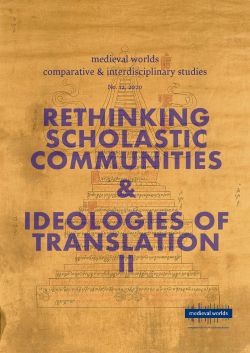Cathy Cantwell
S. 68 - 79
doi:
10.1553/medievalworlds_no12_2020s68
Verlag der Österreichischen Akademie der Wissenschaften
doi:
10.1553/medievalworlds_no12_2020s68
Abstract:
The eleventh to thirteenth centuries in Tibet witnessed the development of religious schools based on the »New Transmissions« (gsar ’gyur) of Buddhist Tantras or the »Later Spread« (phyi dar) of Buddhism, in contrast to the »Early Transmissions« (snga ’gyur) of Tibetan Imperial times (seventh to ninth centuries CE). This period saw the beginnings of the system in which Buddhist monasteries became seats of religious and politico-economic authority throughout communities in Tibet. At the same time, in this culturally creative environment, followers of the »Ancient Transmissions« began to codify their textual heritage, resulting in the subsequent development of a rNying ma school, based especially on: i. the practice of the Inner Tantras (mahāyoga, anuyoga, atiyoga) and the Eight Sacred Word (bka’ brgyad) tantric deity cycles; ii. the related textual corpus of scriptures known as the »Ancient Tantra Collection« (rnying ma rgyud ’bum); iii. popular accounts of and rituals connected with the early tantric masters and their spiritual and magical feats, and especially the cult of the tantric guru and »second Buddha«, Padmasambhava, together with his key disciples; iv. the traditions of revelation, in which revealers identified as rebirths of the tradition’s cultural heroes continue to augment the textual heritage in each generation. Myang ral Nyi ma ’od zer was seminal to this development: himself a tantric revealer recognised as a rebirth of the emperor Khri srong lde’u btsan, he was responsible for a multi-volume revealed collection on the Eight Sacred Word deities, the Eightfold Sacred Word, Embodying the Sugatas (bka’ brgyad bde gshegs ’dus pa); was central to the lineage of the transmitted texts (bka’ ma) on the same deities; and produced the first full hagiography of Padmasambhava, while his immediate successors began the work of collecting the scriptures for the »Ancient Tantra Collection«, based on organising principles established in his work. This article probes how we should approach authority and authorship in this case. How far and in what sense should we consider Myang ral an »author« of the texts he revealed and why were the new claims to authority so compelling in this case? While Myang ral’s involvement with vision and ritual rather than logical argument or debate clearly distinguish him from mediaeval Tibetan scholastics – even those within his own tradition of Early Transmissions – yet his impressive work in compiling and systematising the heritage from his mentors would suggest that the contrast may not be as extreme as it would first appear.
Tantric revelation; early rNying ma; Myang ral
Published Online:
2020/11/30 14:50:23
Object Identifier:
0xc1aa5576 0x003c0967
Rights:All rights reserved.For questions regarding copyright and copies please contact us by email.
medieval worlds provides a forum for comparative, interdisciplinary and transcultural studies of the Middle Ages. Its aim is to overcome disciplinary boundaries, regional limits and national research traditions in Medieval Studies, to open up new spaces for discussion, and to help developing global perspectives. We focus on the period from c. 400 to 1500 CE but do not stick to rigid periodization.
medieval worlds is open to submissions of broadly comparative studies and matters of global interest, whether in single articles, companion papers, smaller clusters, or special issues on a subject of global/comparative history. We particularly invite studies of wide-ranging connectivity or comparison between different world regions.
Apart from research articles, medieval worlds publishes ongoing debates and project and conference reports on comparative medieval research.
Rethinking Scholastic Communities in Medieval Eurasia
Guest Editors: Pascale Hugon and Birgit Kellner
Rethinking Scholastic Communities in Medieval Eurasia: Introduction
Pascale Hugon and Birgit Kellner
Rethinking Scholastic Communities in Latin Europe:
Competition and Theological Method in the Twelfth Century
Constant J. Mews
Rethinking Buddhist Scholastic Communities Through a Socio-Historical Lens
José Ignacio Cabezón
Myang ral Nyi ma ’od zer (1124-1192):
Authority and Authorship in the Coalescing of the rNying ma Tantric Tradition
Cathy Cantwell
Between disputatio and Polemics: Dialectics as Production of Knowledge in the Middle Ages
Bénédicte Sère
The Tibetan Institutionalisation of Disputation: Understanding a Medieval Monastic Practice
Jonathan Samuels
Ideologies of Translation, II
Hostili praedo ditetur lingua latina: Conceptual Narratives of Translation in the Latin Middle Ages
Réka Forrai
Multilingual Sermons
Guest Editor: Jan Odstrčilík
Multilingual Medieval Sermons: Sources, Theories and Methods
Jan Odstrčilík
Multilingual Texts as a Reflection of Code-Switching in Medieval England: Sermons and Beyond
Herbert Schendl
Orality in its Written Traces: Bilingual reportationes of Sermons in France (Thirteenth Century)
Nicole Bériou
Bilingualism in Medieval Italian Preaching: The Case of Angelo da Porta Sole (d. 1334)
Carlo Delcorno
Bilingual Strategies in Fourteenth-Century Latin Sermons from Catalonia
Lidia Negoi
Typology and Spectrum of Latin-Irish and Latin-English Codeswitches
in Medieval Sermon Literature
Tom ter Horst
Review Article
Review Article: How Far is Global?
Roy Flechner




 Home
Home Print
Print
 References
References
 Share
Share
